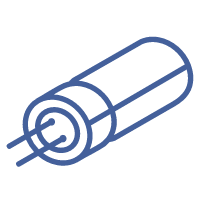AVX Corporation CCR06CG471FS
- Part Number:
- CCR06CG471FS
- Manufacturer:
- AVX Corporation
- Ventron No:
- 8091228-CCR06CG471FS
- Description:
- 470pF Ceramic Capacitor 1% 30ppm/Cel ppm/°C 2 Terminations Molded
- Datasheet:
- CCR06CG471FS
AVX Corporation CCR06CG471FS technical specifications, attributes, parameters and parts with similar specifications to AVX Corporation CCR06CG471FS.
- Factory Lead Time22 Weeks
- MountThrough Hole
- Package / CaseMolded
- Terminal ShapeWIRE
- PackagingBulk
- Published2008
- Tolerance1%
- JESD-609 Codee0
- Pbfree Codeno
- Part StatusActive
- Moisture Sensitivity Level (MSL)Not Applicable
- Number of Terminations2
- TerminationRadial
- ECCN CodeEAR99
- Temperature Coefficient30ppm/Cel ppm/°C
- Terminal FinishTin/Lead (Sn/Pb)
- Max Operating Temperature125°C
- Min Operating Temperature-55°C
- HTS Code8532.24.00.60
- Capacitance470pF
- Depth2.29mm
- Reference StandardMIL-PRF-20
- Lead Pitch5.08mm
- Capacitor TypeCERAMIC CAPACITOR
- DielectricC0G
- Temperature Characteristics CodeCG
- MultilayerYes
- Rated (DC) Voltage (URdc)200V
- Length7.37mm
- Width7.37mm
- Thickness2.29mm
- RoHS StatusNon-RoHS Compliant
CCR06CG471FS Overview
In order to achieve stable operation, the operating temperature should be greater than -55°C.The temperature coefficient of resistance is generally defined as the change in electrical resistance of a substance with respect to per degree change in temperature, and its coefficient is 30ppm/Cel ppm/°C.The lead pitch of a capacitor is simply the distance (spacing) between adjacent threads, and its pitch is 5.08mm.
CCR06CG471FS Features
with 30ppm/Cel ppm/°C being the highest temperature coefficient
CCR06CG471FS Applications
There are a lot of AVX Corporation
CCR06CG471FS applications of ceramic capacitors.
General electronic equipment
Mobile devices
Servers, PCs, tablets
Power supply circuit
In order to achieve stable operation, the operating temperature should be greater than -55°C.The temperature coefficient of resistance is generally defined as the change in electrical resistance of a substance with respect to per degree change in temperature, and its coefficient is 30ppm/Cel ppm/°C.The lead pitch of a capacitor is simply the distance (spacing) between adjacent threads, and its pitch is 5.08mm.
CCR06CG471FS Features
with 30ppm/Cel ppm/°C being the highest temperature coefficient
CCR06CG471FS Applications
There are a lot of AVX Corporation
CCR06CG471FS applications of ceramic capacitors.
General electronic equipment
Mobile devices
Servers, PCs, tablets
Power supply circuit
CCR06CG471FS More Descriptions
Cap Ceramic 470pF 200V C0G 1% Radial 5.08mm (0.001%FR) 125°C Bulk
Capacitor,ceramic,470Pf,200Vdc,1-% Tol,1 % Tol,cg-Tc Code,30Ppm-Tc Rohs Compliant: Yes |Kyocera Avx CCR06CG471FS
CAP CER RADIAL
470PF 200V 1%
Capacitor,ceramic,470Pf,200Vdc,1-% Tol,1 % Tol,cg-Tc Code,30Ppm-Tc Rohs Compliant: Yes |Kyocera Avx CCR06CG471FS
CAP CER RADIAL
470PF 200V 1%
The three parts on the right have similar specifications to CCR06CG471FS.
-
ImagePart NumberManufacturerFactory Lead TimeMountPackage / CaseTerminal ShapePackagingPublishedToleranceJESD-609 CodePbfree CodePart StatusMoisture Sensitivity Level (MSL)Number of TerminationsTerminationECCN CodeTemperature CoefficientTerminal FinishMax Operating TemperatureMin Operating TemperatureHTS CodeCapacitanceDepthReference StandardLead PitchCapacitor TypeDielectricTemperature Characteristics CodeMultilayerRated (DC) Voltage (URdc)LengthWidthThicknessRoHS StatusMounting TypeOperating TemperatureSeriesSize / DimensionFeatureApplicationsVoltage - RatedReach Compliance CodeFailure RateLead SpacingSize CodeLead StyleLead/Base StyleHeight Seated (Max)View Compare
-
 CCR06CG471FS22 WeeksThrough HoleMoldedWIREBulk20081%e0noActiveNot Applicable2RadialEAR9930ppm/Cel ppm/°CTin/Lead (Sn/Pb)125°C-55°C8532.24.00.60470pF2.29mmMIL-PRF-205.08mmCERAMIC CAPACITORC0GCGYes200V7.37mm7.37mm2.29mmNon-RoHS Compliant---------------
CCR06CG471FS22 WeeksThrough HoleMoldedWIREBulk20081%e0noActiveNot Applicable2RadialEAR9930ppm/Cel ppm/°CTin/Lead (Sn/Pb)125°C-55°C8532.24.00.60470pF2.29mmMIL-PRF-205.08mmCERAMIC CAPACITORC0GCGYes200V7.37mm7.37mm2.29mmNon-RoHS Compliant--------------- -
 22 WeeksThrough HoleMoldedWIREBulk20085%e0noActiveNot Applicable2RadialEAR9930ppm/Cel ppm/°CTin/Lead (Sn/Pb)125°C-55°C8532.24.00.6010nF2.29mmMIL-PRF-205.08mmCERAMIC CAPACITORC0GCGYes50V7.37mm7.37mm2.29mmNon-RoHS Compliant--------------
22 WeeksThrough HoleMoldedWIREBulk20085%e0noActiveNot Applicable2RadialEAR9930ppm/Cel ppm/°CTin/Lead (Sn/Pb)125°C-55°C8532.24.00.6010nF2.29mmMIL-PRF-205.08mmCERAMIC CAPACITORC0GCGYes50V7.37mm7.37mm2.29mmNon-RoHS Compliant-------------- -
 -Through HoleRadialWIREBulk2012±1%e0noActive1 (Unlimited)2-EAR99C0G NP0Tin/Lead (Sn/Pb)--8532.23.00.60270pF2.29mmMIL-PRF-20/355.08mmCERAMIC CAPACITORC0GC0GNo200V4.83mm--Non-RoHS CompliantThrough Hole-55°C~125°CMilitary, MIL-PRF-20, CCR050.190Lx0.090W 4.83mmx2.29mmMilitaryHigh Reliability200Vnot_compliantP (0.1%)0.200 5.08mm1909Formed LeadsFormed Leads0.200 5.08mm
-Through HoleRadialWIREBulk2012±1%e0noActive1 (Unlimited)2-EAR99C0G NP0Tin/Lead (Sn/Pb)--8532.23.00.60270pF2.29mmMIL-PRF-20/355.08mmCERAMIC CAPACITORC0GC0GNo200V4.83mm--Non-RoHS CompliantThrough Hole-55°C~125°CMilitary, MIL-PRF-20, CCR050.190Lx0.090W 4.83mmx2.29mmMilitaryHigh Reliability200Vnot_compliantP (0.1%)0.200 5.08mm1909Formed LeadsFormed Leads0.200 5.08mm -
 22 WeeksThrough HoleMoldedWIREBulk20081%e0noActiveNot Applicable2RadialEAR9930ppm/Cel ppm/°CTin/Lead (Sn/Pb)125°C-55°C8532.24.00.60120pF2.29mmMIL-PRF-205.08mmCERAMIC CAPACITORC0GC0GYes200V4.83mm4.83mm2.29mmNon-RoHS Compliant----------1909---
22 WeeksThrough HoleMoldedWIREBulk20081%e0noActiveNot Applicable2RadialEAR9930ppm/Cel ppm/°CTin/Lead (Sn/Pb)125°C-55°C8532.24.00.60120pF2.29mmMIL-PRF-205.08mmCERAMIC CAPACITORC0GC0GYes200V4.83mm4.83mm2.29mmNon-RoHS Compliant----------1909---
Popular Search Part Number
Related Keywords
Search Tags
Latest News
-
26 December 2023
LM358DR Dual Operational Amplifier Characteristics, Applications, LM358DR vs LM358S
Ⅰ. LM358DR descriptionⅡ. Pin configuration of LM358DRⅢ. What are the characteristics of LM358DR?Ⅳ. How to adjust the gain setting of the LM358DR chip?Ⅴ. Schematic diagram of LM358DRⅥ. What... -
26 December 2023
An Overview of BAV99 Switching Diode
Ⅰ. What is a switching diode?Ⅱ. Introduction of BAV99Ⅲ. What are the functions of BAV99 diode?Ⅳ. Typical characteristics of BAV99 diodeⅤ. Technical parameters of BAV99 diodeⅥ. How to... -
27 December 2023
Everything You Need to Know About STM8S003F3P6TR Microcontroller
Ⅰ. Overview of STM8S003F3P6TRⅡ. Structure of STM8S003F3P6TR microcontrollerⅢ. Package of STM8S003F3P6TR microcontrollerⅣ. STM8S003F3P6TR priceⅤ. Advantages and application scenarios of STM8S003F3P6TRⅥ. STM8S003F3P6TR specificationsⅦ. What are the characteristics of STM8S003F3P6TR... -
27 December 2023
Applications and Usage of IR2011STRPBF Isolated Gate Driver
Ⅰ. What is a gate driver?Ⅱ. Introduction to IR2011STRPBFⅢ. Dimensions and package of IR2011STRPBFⅣ. Technical parameters of IR2011STRPBFⅤ. Who produces the IR2011STRPBF?Ⅵ. Absolute maximum ratings of IR2011STRPBFⅦ. Where...

Help you to save your cost and time.

Reliable package for your goods.

Fast Reliable Delivery to save time.

Quality premium after-sale service.



